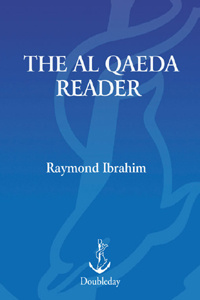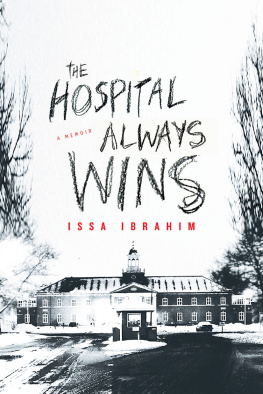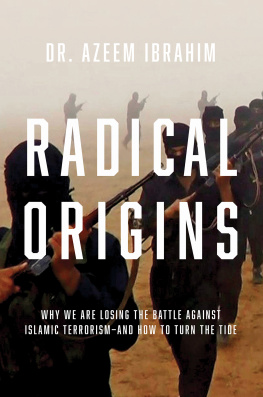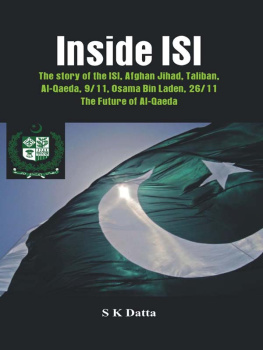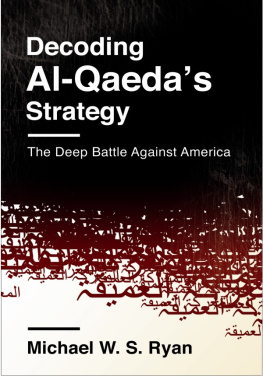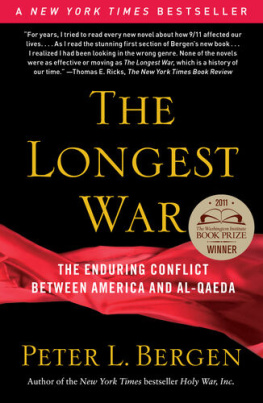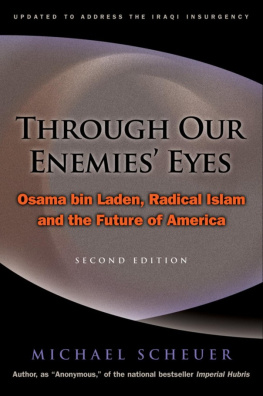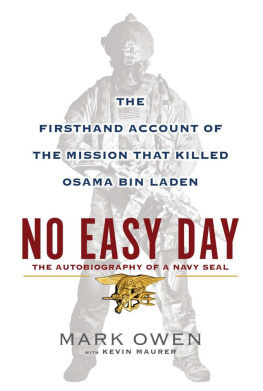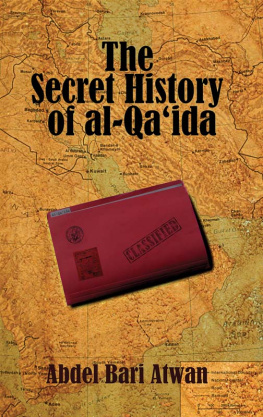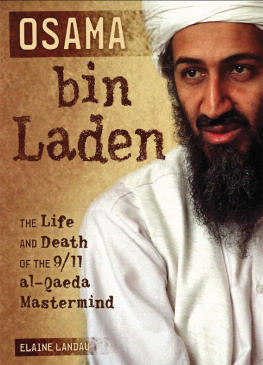

CONTENTS

TO MY SON, ALEXANDER,
AND FOR ALETHEIA
PREFACE

T he tragedy of September 11, 2001, has influenced many. It altered my academic interests away from the ancient and medieval Mediterraneana landscape of long-ago Mesopotamians, Egyptians, Greeks, Romans, Byzantines, Arabs, and Turksand led me to strictly focus on the contemporary Arab-Islamic world. Like many others, after 9/11 I desired to learn what precisely was the motivationand inspirationof radical Islamic groups such as al-Qaeda, who had formally declared war on the United States.
To make a long story short, in 2002 I applied to and was accepted by Georgetown Universitys Center for Contemporary Arab Studiesa leading institution in Islamic studies located in Washington, D.C. Soon thereafter, I also landed an internship at the Near East section of the Library of Congresswhere the largest collection of Arabic books in the United States is housed. When, happily, the internship evolved into a permanent, full-time positionand considering the exigencies of newly married life and fatherhoodI took a leave of absence from my formal academic studies in order to focus on more practical work.
Finding myself in the worlds largest library, and working in the division that houses all Arabic materialswhere thousands of new books, serials, microfilms, etc., arrive yearly from the little-known publishing houses of the Arab world, many dealing with radical IslamI was, admittedly, like the proverbial child in a well-stocked toy store.
Arabic books dealing with radical Islam, al-Qaeda, or terrorism passing through my handsand these were manynaturally were perused. It was with some shock that I discovered that a good number of these contained not only hitherto unknown excerpts or quotes by al-Qaeda, but entire treatises and even whole books written by them. Thus I came to discover that a good number of these had never been translated into English, much less disseminated to the general public.
Further striking, most of their writings and speeches neatly fit into two genresreligious exegesis, meant to motivate and instruct Muslims, and propagandist speeches, aimed at demoralizing the West and inciting Muslims to action.
Out of that examination of such a disparate group of writings, this present book of translated documents was conceived and the idea of its publication accepted.
This volume is presented to the public for educational and didactic purposesfor Americans to know and comprehend their enemy, an essential prerequisite throughout history for victory. This volume of translations, taken as a whole, proves once and for all that, despite the propaganda of al-Qaeda and its sympathizers, radical Islams war with the West is not finite and limited to political grievancesreal or imaginedbut is existential, transcending time and space and deeply rooted in faith.
Furthermore, censoring political speeches and writingsparticularly in the United States in the era of its struggle of ideas against absolutismmight only encourage the belief that such statements by al-Qaeda must be true, hence the need to silence them. In fact, bin Laden has used this very argument to win widespread agreement in the Arab world. On October 10, 2001, for example, the White House advised television networks to censor bin Laden broadcasts, citing the possibility of coded messages to other terrorist cells. Less than two weeks later, bin Laden, in an interview on the al-Jazeera television network, had this to say about it:
The values of this Western civilization under the leadership of America have been destroyed. Those awesome symbolic [twin] towers that spoke of liberty, human rights, and humanity have been destroyed. They have gone up in smoke. The proof came when the U.S. government pressured the media not to run our statements that are not longer than a very few minutes. They forgot all about fair and objective reporting and reporting the other side of the issue. I tell you freedom and human rights in America are doomed.1
The publication of this book proves otherwise.
Raymond Ibrahim
Washington, D.C., October 2006
ACKNOWLEDGMENTS

I first wish to thank my former professor and M.A. thesis chair, Victor Davis Hanson, currently a Senior Fellow at the Hoover Institution, Stanford University. It was to him that I first took my initial ideas about these translations, and it was he who referred me to his literary agents Glen Hartley and Lynn Chu of Writers Representativeswho, in their turn, took my proposal to editor-at-large Adam Bellow of Doubleday. To all of them, I offer my gratitudefirst for their wisdom in appreciating the importance of such an endeavor, but also for their courage, especially Doubleday, in supporting what proved to be a controversial project years before its materialization.
My thanks to Mary-Jane Deeb, Chief of the African and Middle Eastern Division of the Library of Congress (and subsequently my boss) for first giving me, a then unemployed graduate student, the opportunity to work at the Library of Congressan experience that has thus far proven to be both intrinsically and instrumentally rewarding.
I thank my father and mother for all their support, and for first instilling in me a curiosity toward language as well as a special interest in Arabic and our ancestral homeland of Egypt.
Finally, my thanks are due to my wife, who, since the start of this project, has had to endure her husbands (sometimes excessive) linguistic, philological, and historical attempts at unraveling the philosophy of radical Islam.
NOTE ON TEXT AND TRANSLATION

T he translations included in this volume come from various sources. The four documents that form the Theology section were originally posted on the Internet by many Islamist Web sites (which were subsequently shut down) but are still found separately in a number of Arabic books. For those interested in sourcing original Arabic copies, there is one particular title that conveniently contains all four, called (in translation), Alliance of Terrorism: The Al-Qaeda Organization .1 Most of the selections of the Propaganda section were translated directly from video-and audiotapes and transcripts found on the Internetespecially from the al-Jazeera Web site (http://www.aljazeera.net) and MEMRI (the Middle East Media Research Institute: http://www.memri.org). Both of these organizations should be commended for the important services they render.
An anonymous French wit is credited with saying that translations are like wiveseither beautiful or faithful, seldom both. Translating from such unrelated languages as Arabic and Englishfrom Semitic to Germanicmakes such a slander somewhat appreciable. Still, I have tried to dispel this cynical rumor by trying to wed both virtues in the forthcoming translations. On those occasions, however, where a choice had to be made between fidelity and aesthetics, I always opted for the former, even if less-than-fluid English was the result. In short, since this volume is presented for didactical and not literary purposes, priority has always been given to capturing precise meaning, with style and idiomatic usage coming second.
In order to appeal to a broad readership, certain measures were taken to ensure that the translation is as user-friendly as possible. Here pedantry gave way to accessibility. The most common and familiar name spellings were used, even if they are not as phonetically accurate as more updated versions. For example, al-Quran and Salah ad-Din are here spelled Koran and Saladin . Diacritics have been avoided as well as the inverted apostrophe representing the Arabic letter ayn , since such markings usually serve to make an already strange word that much more bewildering for the general English reader. In most cases, the Arabic hamza (represented by an apostrophe and pronounced as a glottal stop) is retained: its appearance is generally widespread, and without it many words become unrecognizable. The unpronounced h in words ending in the Arabic ta-marbuta (e.g., sharia instead of shariah ) has been omitted. Since Arabic singulars often morph into nearly unrecognizable plurals, the latter have been anglicized by merely adding an s (e.g., hadiths instead of ahadith , fatwas instead of fatawa ), except for words that have recognizable singulars and plurals, in which case both have been preserved (e.g., mujahid and mujahidin ). (Scholar is here used for the singular of ulema: Alim is rarely seen in English, and at any rate, it is the plural ulema that bears an important connotation, that of consensus.) All dates have been rendered according to the Gregorian calendar.
Next page
